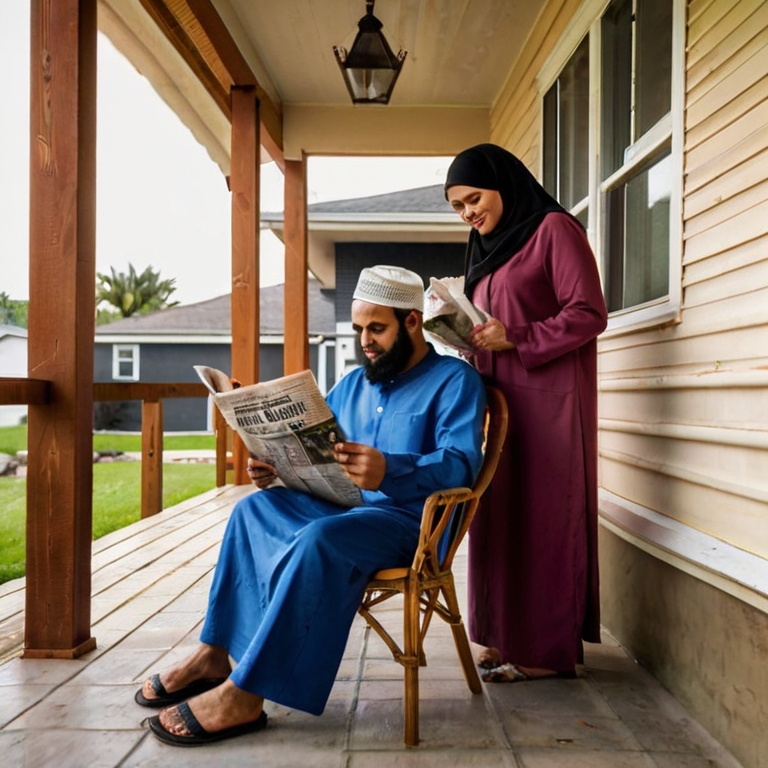Risks and Safeguards in Halal Mortgage Agreements
Introduction to Halal Mortgages in Canada
In the diverse and inclusive landscape of Canadian real estate, halal mortgages have emerged as a vital financial solution for many Muslim Canadians seeking homeownership without compromising their religious principles. These mortgage agreements, designed to comply with Islamic finance laws that prohibit interest, offer a unique approach to buying a home. Unlike traditional mortgages that rely on interest payments, halal mortgages are structured around co-ownership (diminishing musharaka) or lease-to-own (ijara) models, allowing buyers to make payments towards owning a home outright without directly paying interest.
The appeal of halal mortgages in Canada is not limited to their compliance with Islamic law; they also embody a commitment to ethical finance, emphasizing transparency, risk-sharing, and the avoidance of speculative practices. This ethical dimension aligns with the values of a growing number of Canadians, making halal mortgages a significant and growing segment of the country's financial market.

However, navigating the halal mortgage market in Canada comes with its unique set of challenges and risks. These range from the financial implications of these agreements, through to their legal standings and the market's evolving nature in a predominantly interest-based global economy. Understanding these risks and the safeguards available is crucial for prospective homebuyers.
This article aims to guide Canadian homebuyers through the complexities of halal mortgage agreements, shedding light on the inherent risks and detailing the legal safeguards that exist within Canadian law to protect them. By arming yourself with knowledge, you can navigate these waters more safely, ensuring that your journey towards homeownership is both spiritually fulfilling and financially secure.
Navigating Risks in Halal Mortgage Agreements
In the dynamic world of Canadian real estate, the concept of halal mortgages has emerged as a beacon of financial inclusivity, offering Muslim homebuyers an opportunity to finance their homes in a way that aligns with Islamic law. This law, or Shariah, prohibits the payment or acceptance of interest (riba), which is a common component of traditional mortgage agreements. As a result, halal mortgages are structured differently, utilizing various Islamic financing principles like Murabaha (cost-plus financing) and Ijara (leasing).

However, as with any financial agreement, entering into a halal mortgage in Canada comes with its own set of risks and considerations. These range from financial implications and market volatility to the intricacies of Canadian mortgage laws. Understanding these risks is crucial for homebuyers to ensure that their investment is secure and compliant with both Islamic principles and Canadian legal standards.
This article aims to shed light on the potential risks involved in halal mortgage agreements in Canada and the safeguards that can be put in place to protect homebuyers. From legal protections offered by Canadian law to best practices in risk mitigation, we will guide you through the essential steps to secure your investment in a halal-compliant manner. Whether you're a first-time homebuyer or looking to refinance your property through a halal mortgage, this guide will provide you with the knowledge you need to navigate the market confidently and securely.

Introduction to Halal Mortgages in Canada
The concept of halal mortgages in Canada represents a fusion of Islamic financial principles with the Canadian legal and economic framework, creating a viable pathway for Muslims to own homes without compromising their faith. Unlike traditional mortgages that thrive on the concept of interest, halal mortgages operate on Shariah-compliant financing models that avoid Riba (interest), a practice strictly prohibited in Islam. This section delves into the essence of halal mortgages, their significance, and their operation within the Canadian context.
The Essence and Significance of Halal Mortgages
Halal mortgages are designed to fulfill the homeownership dreams of Canadian Muslims in a manner that adheres to Islamic finance principles. These mortgages are not just financial products but a testament to financial inclusivity and religious adherence, offering a solution that bridges faith and the need for housing. The significance of halal mortgages extends beyond the financial aspect, embedding itself in the social fabric by providing Muslims with the opportunity to invest in real estate, which is a crucial component of economic stability and growth.
Shariah-Compliant Financing Models
In Canada, halal mortgage providers typically employ two primary models of Islamic financing: Murabaha and Ijara. The Murabaha model involves the bank purchasing the property and selling it to the buyer at a profit, whereas the Ijara model functions through leasing, where the bank buys the property and leases it to the buyer until the full payment is made, transferring ownership to the buyer. These models ensure that the transactions remain free from interest, aligning with Islamic laws while still fitting within the regulatory and legal frameworks of Canada.

Operation within the Canadian Context
The operation of halal mortgages in Canada is a testament to the country's commitment to financial diversity and inclusion. Canadian laws and regulations provide a supportive environment for the functioning of Islamic finance institutions, allowing them to offer halal mortgages that comply with federal and provincial guidelines. This supportive legal framework ensures that halal mortgages are not just religiously compliant but also secure and recognized under Canadian law, offering peace of mind to Muslim homebuyers.
Through the introduction of halal mortgages, Canada has opened its doors wider to financial inclusivity, allowing Muslim Canadians to participate more fully in the housing market. This initiative not only supports the financial well-being of Muslim families but also enriches the Canadian economic landscape with diversity and inclusion.

Understanding the Risks
While halal mortgages in Canada offer a unique opportunity for Muslims to own homes without compromising their religious beliefs, it's important for potential buyers to be aware of the various risks involved. These risks can impact not only the financial health of the buyer but also the overall success of the mortgage agreement. Below, we detail some of the key risks associated with halal mortgage agreements and provide insights into how they can be managed.
Financial Risks
One of the primary concerns with halal mortgages is the potential for higher overall costs compared to conventional mortgages. Since Islamic banks cannot charge interest, they may incorporate profit margins into the cost of the property or lease agreements, which might result in higher payments. Additionally, fluctuations in market conditions can affect the terms of the agreement, potentially leading to increased financial burdens on the buyer.
Legal Risks
Navigating the legal landscape of halal mortgages in Canada can be complex, given the hybrid nature of these financial products that must adhere to both Islamic principles and Canadian laws. There is a risk of entering into agreements that might not be fully recognized or protected under Canadian law, especially if the financial institution is not well-versed in local legal requirements. This can lead to complications in the event of disputes or defaults.

Market Risks
The real estate market's volatility can significantly affect halal mortgages, just as it does with traditional mortgages. Property values can fluctuate, impacting the equity of the home and potentially leading to negative equity situations. Additionally, since the halal mortgage market in Canada is relatively niche, there might be limited options available for refinancing or transferring the mortgage, which could be disadvantageous in a fluctuating market.
Compliance Risks
Ensuring that a halal mortgage remains compliant with Islamic finance principles throughout its term can be challenging. Changes in the structure of the financial institution, the terms of the agreement, or the interpretation of Shariah principles can lead to a mortgage becoming non-compliant, which might have spiritual implications for the buyer.

Mitigating Risks
Understanding these risks is the first step toward mitigating them. Prospective buyers should conduct thorough research, seek advice from financial advisors familiar with both Canadian and Islamic finance laws, and choose reputable institutions that offer transparency and legal compliance in their halal mortgage products.
By being aware of the potential risks and actively seeking to mitigate them, Canadian Muslims can better navigate the complex landscape of halal mortgages, ensuring that their path to homeownership is both spiritually and financially rewarding.

Legal Safeguards for Homebuyers
For individuals entering into halal mortgage agreements in Canada, understanding the protective legal framework is crucial. The Canadian legal system provides several safeguards to ensure that all mortgage agreements, including those compliant with Islamic finance principles, offer security and fairness to homebuyers. This segment outlines the key legal protections and how they apply to halal mortgages, offering peace of mind to those looking to navigate this financial pathway.
Regulatory Framework
The Canadian financial system is highly regulated, with stringent oversight applied to all lending institutions, including those offering halal mortgages. This regulatory environment ensures that financial products are transparent, fair, and in compliance with both national and provincial laws. For halal mortgages, this means that agreements must meet specific standards for financial practice, ensuring the protection of homebuyers' interests.

Disclosure and Transparency
Canadian laws mandate full disclosure and transparency in all mortgage agreements. Lenders, including halal mortgage providers, are required to clearly outline the terms of the mortgage, including payment structures, total costs, and any fees or penalties. This ensures that buyers are fully informed before entering into an agreement and can make decisions based on a comprehensive understanding of their obligations and rights.
Recourse and Dispute Resolution
In the event of a dispute or dissatisfaction with the terms of the mortgage, Canadian homebuyers have access to various recourse mechanisms. This includes the ability to file complaints with regulatory bodies, seek mediation or arbitration, and, if necessary, pursue legal action in court. These avenues provide a layer of security for buyers, ensuring that they have means to seek redress and enforcement of their rights.
Consumer Protection Laws
Beyond the specific regulations governing mortgages, Canadian consumer protection laws offer additional layers of security for homebuyers. These laws protect against unfair practices, fraud, and misrepresentation, offering further assurance that halal mortgage agreements are conducted in a manner that is both ethical and compliant with Canadian standards.
Best Practices for Ensuring Legal Safeguards
To fully benefit from these legal safeguards, homebuyers considering halal mortgages should take proactive steps, including consulting with legal experts familiar with both Canadian law and Islamic finance, thoroughly reviewing all mortgage documents before signing, and staying informed about their rights and responsibilities as consumers.

Understanding these legal safeguards provides a solid foundation of confidence for Canadian Muslims exploring halal mortgages as a pathway to homeownership. By ensuring that these financial agreements are backed by a robust legal framework, homebuyers can proceed with assurance that their investment is secure and their rights are protected.

Best Practices for Risk Mitigation
Entering into a halal mortgage agreement in Canada is a significant financial decision that requires careful consideration and planning. To mitigate the risks associated with these specialized financial products, prospective buyers can follow several best practices. These strategies ensure that the agreement aligns with both their financial goals and religious principles, while also safeguarding against potential pitfalls.
Conduct Thorough Research
Begin with in-depth research into different halal mortgage providers and the specific products they offer. Understand the terms, conditions, and the financial implications of each option. Comparing different providers can help you find the most competitive rates and terms that best suit your financial situation and goals.
Seek Professional Advice
Consult with financial advisors who are experienced in both Canadian mortgage laws and Islamic finance principles. Such advisors can provide valuable insights into the intricacies of halal mortgages, helping you make informed decisions and identify potential risks and how to avoid them.

Understand the Legal Framework
Familiarize yourself with the Canadian legal framework surrounding mortgages and consumer protection. Knowledge of your rights and obligations under the law can provide a safety net, ensuring that you're entering into a legally sound and protected agreement.
Plan for Financial Stability
Given the potential for higher costs associated with some halal mortgage agreements, it's crucial to assess your financial stability carefully. This includes having a solid plan for savings, emergency funds, and understanding the long-term financial commitment you're making. Consider future financial scenarios and how they might impact your ability to fulfill your mortgage obligations.
Regular Compliance Checks
Ensure that your halal mortgage agreement remains compliant with Islamic finance principles throughout its term. This may involve regular consultations with a Shariah advisor or board to confirm that your mortgage continues to align with these principles, especially if there are changes in the terms or structure of your agreement.

Stay Informed About Market Changes
The real estate and financial markets are dynamic and can change rapidly. Staying informed about these changes and understanding how they might affect your mortgage is crucial. This knowledge can aid in making timely decisions, such as refinancing options or adjustments to your payment plan, to remain in a favorable position.
By adhering to these best practices, Canadian Muslims can more confidently engage in halal mortgage agreements, ensuring that their journey to homeownership is both financially prudent and religiously compliant. These strategies not only mitigate risks but also enhance the overall experience of investing in a home.
Best Practices for Risk Mitigation
Engaging in a halal mortgage agreement in Canada is a significant step towards homeownership for many Muslims, aligning their financial decisions with their faith. While the unique structure of halal mortgages avoids interest, it also introduces specific considerations for risk management. Below are best practices that can help mitigate these risks, ensuring a smoother journey towards owning a home.

Conduct Thorough Research
Before entering into a halal mortgage agreement, it’s crucial to conduct comprehensive research. Understand the different Islamic financing models used by banks in Canada, such as Murabaha and Ijara, and how they align with both your financial situation and Islamic principles. Compare offerings from various institutions to find the best terms and conditions that meet your needs.
Consult with Islamic Finance Experts
Consulting with experts in Islamic finance can provide valuable insights into the structure of halal mortgages and help you navigate the complex landscape of Shariah-compliant financing. These professionals can also offer advice on ensuring your agreement remains compliant with Islamic principles throughout its term.

Seek Legal Counsel
Given the intricacies of Canadian law concerning halal mortgages, seeking advice from legal professionals familiar with both Canadian mortgage laws and Islamic finance is advisable. They can help review and explain the terms of your mortgage agreement, ensuring it is legally sound and protects your rights as a homebuyer.
Prepare for Market Fluctuations
The real estate market is inherently volatile, and market conditions can change. To safeguard against potential risks, it’s wise to have a contingency plan. This could involve setting aside a reserve fund to cover unexpected costs or being prepared to renegotiate terms if market conditions change significantly.
Review and Understand All Documents
Before signing any documents, ensure you fully understand every aspect of your mortgage agreement. Pay special attention to the terms of the contract, payment structures, any penalties for early payment or default, and mechanisms for dispute resolution. Don’t hesitate to ask for clarification on any points that are unclear.

Regularly Review Your Financial Situation
Regularly assessing your financial situation can help you stay on top of your mortgage payments and any other obligations. This ongoing review can also identify when it might be beneficial to refinance or adjust the terms of your mortgage to better suit your current financial status.
By adhering to these best practices, prospective homebuyers can navigate the complexities of halal mortgages in Canada with greater confidence and security. Understanding and mitigating the risks involved not only ensures compliance with Islamic principles but also promotes financial stability and peace of mind.
Best Practices for Risk Mitigation
Engaging in a halal mortgage agreement in Canada is a significant step towards homeownership for many Muslims, aligning their financial decisions with their faith. While the unique structure of halal mortgages avoids interest, it also introduces specific considerations for risk management. Below are best practices that can help mitigate these risks, ensuring a smoother journey towards owning a home.
Conduct Thorough Research
Before entering into a halal mortgage agreement, it’s crucial to conduct comprehensive research. Understand the different Islamic financing models used by banks in Canada, such as Murabaha and Ijara, and how they align with both your financial situation and Islamic principles. Compare offerings from various institutions to find the best terms and conditions that meet your needs.

Consult with Islamic Finance Experts
Consulting with experts in Islamic finance can provide valuable insights into the structure of halal mortgages and help you navigate the complex landscape of Shariah-compliant financing. These professionals can also offer advice on ensuring your agreement remains compliant with Islamic principles throughout its term.
Seek Legal Counsel
Given the intricacies of Canadian law concerning halal mortgages, seeking advice from legal professionals familiar with both Canadian mortgage laws and Islamic finance is advisable. They can help review and explain the terms of your mortgage agreement, ensuring it is legally sound and protects your rights as a homebuyer.

Prepare for Market Fluctuations
The real estate market is inherently volatile, and market conditions can change. To safeguard against potential risks, it’s wise to have a contingency plan. This could involve setting aside a reserve fund to cover unexpected costs or being prepared to renegotiate terms if market conditions change significantly.
Review and Understand All Documents
Before signing any documents, ensure you fully understand every aspect of your mortgage agreement. Pay special attention to the terms of the contract, payment structures, any penalties for early payment or default, and mechanisms for dispute resolution. Don’t hesitate to ask for clarification on any points that are unclear.
Regularly Review Your Financial Situation
Regularly assessing your financial situation can help you stay on top of your mortgage payments and any other obligations. This ongoing review can also identify when it might be beneficial to refinance or adjust the terms of your mortgage to better suit your current financial status.
By adhering to these best practices, prospective homebuyers can navigate the complexities of halal mortgages in Canada with greater confidence and security. Understanding and mitigating the risks involved not only ensures compliance with Islamic principles but also promotes financial stability and peace of mind.

The Future of Halal Mortgages in Canada
As the demand for Islamic financial products grows within Canada's diverse population, the future of halal mortgages looks promising. This growing trend not only signifies a wider acceptance and understanding of Islamic finance but also points to the potential for increased innovation and inclusivity in the Canadian financial market. Here, we delve into the factors that could shape the future of halal mortgages in Canada and what potential buyers might expect in the years to come.
Increasing Demand and Awareness
With the Muslim population in Canada on the rise, the demand for Shariah-compliant financial products, including halal mortgages, is set to increase. This demographic shift is likely to drive greater awareness and understanding of Islamic finance principles, not just among Muslims but across the broader Canadian society. Financial institutions might respond by expanding their halal mortgage offerings, providing more options for potential homebuyers.

Regulatory Evolution and Innovation
As the market for halal mortgages grows, we may see further evolution in regulatory frameworks to better accommodate Islamic finance principles. This could involve the introduction of new laws or amendments to existing ones, aimed at ensuring that halal mortgages are both compliant with Islamic finance and integrated smoothly into Canada’s legal and financial landscape. Such changes could foster innovation, leading to more competitive and diverse mortgage products.
Technological Advancements
Technology is set to play a pivotal role in the future of halal mortgages in Canada. Fintech companies, leveraging blockchain and other innovative technologies, could introduce more transparent, efficient, and user-friendly ways of managing halal mortgages. These advancements may make Shariah-compliant mortgages more accessible to a broader audience and streamline the application and management processes.

Global Influences
The global Islamic finance market is expanding, and its influences on Canadian financial products, including halal mortgages, are significant. Canada’s financial institutions might increasingly look to international best practices and partnerships to enhance their Islamic finance offerings. This global perspective could introduce new financial models and strategies to the Canadian market, enriching the options available to Muslim homebuyers.
Community and Economic Impact
The growth of halal mortgages in Canada has the potential to positively impact not just the Muslim community but the Canadian economy as a whole. By facilitating homeownership in a way that aligns with Islamic values, halal mortgages can contribute to economic stability, diversity, and inclusivity. As more Canadians gain access to home financing that respects their cultural and religious beliefs, the social and economic benefits will likely be felt across the nation.
Looking ahead, the future of halal mortgages in Canada is bright, marked by growth, innovation, and a deeper integration into the fabric of Canadian society. As this financial sector evolves, it promises to offer more opportunities for Canadian Muslims to achieve homeownership, contributing to a more inclusive and diverse financial landscape.





